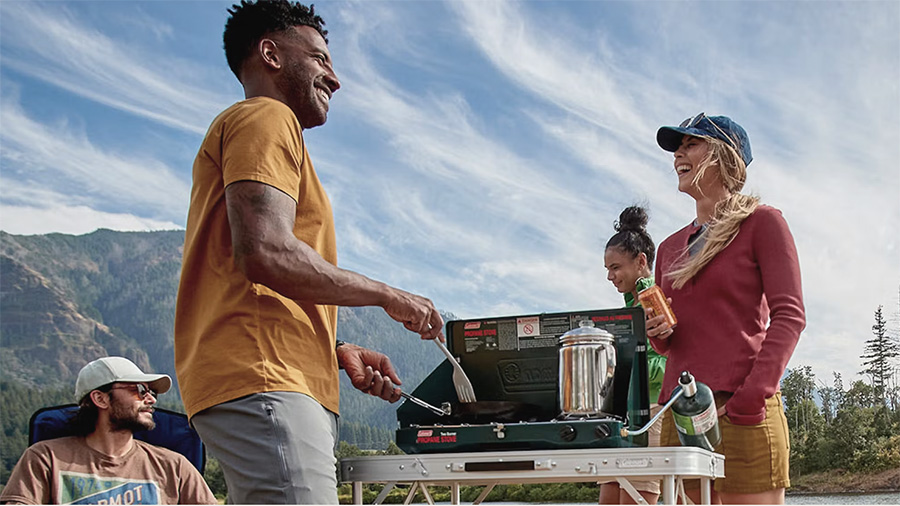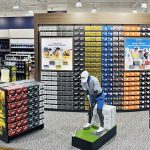Newell Brands, Inc., parent of Coleman, Marmot, Ex Officio, Stearns, Bubba and Contigo and other consumer brands, expects to be able to largely withstand and possibly benefit from a higher-tariff environment while predicting a larger decline in core sales for the year.
Despite reporting better-than-expected first-quarter results, Newell guided for core sales to decline between 1 percent and 3 percent in 2025 compared with a previous forecast in the range of a gain of 1 percent to a decline of 2 percent.
“We believe this is prudent given lower consumer confidence levels and more muted macroeconomic forecasts. Importantly, we are not changing our forecast for market share for the year, as our new product innovation pipeline remains on track,” company CEO Chris Peterson noted on a conference call with analysts.
He also said that although the company has not seen consumption levels decline in categories broadly versus its plan, Newell is taking a more cautious outlook given the broader warnings on the economy to avoid overstocking inventory and “having too much cash flow.”
Newell’s other major brands include Rubbermaid, Sharpie, Graco, Rubbermaid Commercial Products, Yankee Candle, Paper Mate, FoodSaver, Dymo, Expo, Elmer’s, Oster, Nuk, Spontex, and Campingaz.
At the same time, Newell reiterated its guidance for the year calling for normalized earnings in the range of 70 to 76 cents a share, believing it will benefit from past efforts to diversify sourcing and avoid tariff impacts.
“We believe past decisions to proactively prepare for higher China tariffs by aggressively shifting sourced finished goods procurement to alternate geographies and to maintain and invest in a robust and extensive in-house domestic manufacturing base, while many of our top competitors outsourced or offshored much of their production capability, gives us a unique opportunity to not just manage through this period of tariff related sourcing dislocations, but to be on a net basis significant beneficiaries of them,” said Peterson.
He noted that Newell’s total cost of goods sold of sourced finished goods imported into the U.S. from China was 15 percent in 2024, down from 35 percent “just a few years ago.” Total sourced finished goods imported to the U.S. from all countries represented 24 percent of Newell’s total global cost of goods sold. Excluding the 15 percent imported from China, Mexico, which is 98 percent USMCA compliant and exempt from the current tariffs, was the second largest country of origin, accounting for roughly half of the remaining 9 percent of U. S. imports.
He said, “The remaining balance is sourced from various countries, none of which individually exceed 1 percent of our total global cost of goods sold. This effectively means that China is what we needed to be focused on. That is why, even prior to the announcement of an additional 125 percent tariff on Chinese imported goods, we had plans to reduce U.S.-sourced finished goods from China down to 10 percent by the end of 2025, and even lower than that by the end of 2026.”
He added that considering the incremental 125 percent tariffs being placed on China, Newell has “done what many leading retailers have done and paused virtually all outstanding Chinese purchase orders.” He also said that as noted on a February quarterly call, Newlell is not be signing up any new suppliers who do not already have manufacturing capabilities outside of China.
He further said that over 60 percent of Newell’s total sales are in the U.S. and the company has invested nearly $2 billion in U. S. manufacturing since the 2017 Tax Cuts and Jobs Act was passed. As a result, more than half of Newell’s 2024 U. S. sales were manufactured through its North America supply base and are not subject to tariffs. He added, “We believe that the number of categories where we are strategically advantaged with North American tariff-free production significantly exceeds the number of categories where we are disadvantaged.”
He noted that its 15 U. S. plants and two USMCA-compliant plants in Mexico collectively have about 7,300 employees supporting eight of its top 10 brands: Rubbermaid, Rubbermaid Commercial, Sharpie, Expo, Yankee Candle, Papermate, Coleman and Oster. Nook baby care products and Ball Mason jars are also manufactured domestically.
“Many of these products compete against China-sourced brands, which we believe provides us with a significant competitive advantage in the current environment,” said Peterson. “With a significant number of customers canceling outstanding purchase orders and actively stopping shipments from China, we have significant untapped capacity across our U. S. And Mexico facilities due to the automation and operational excellence programs we have implemented over the past several years. This gives us the ability to quickly ramp up production of high-quality products not subject to tariffs to allow our top strategic customers to keep their store shelves full.”
Peterson said the decision not to change its expectations around its EPS and operating margin guidance is also due to expectations of lower commodity and input cost inflation, favorable foreign exchange, stronger productivity results, and select pricing actions to offset higher tariff costs.
The CEO said Newell continues to expect stronger top-line performance in the back half of the year compared to the front half based on the timing of innovation launches and distribution gains.
As reported earlier by SGB Media (see below), Newell’s sales were $1.6 billion in the first quarter, a decline of 5.3 percent compared with the prior year period, reflecting a core sales decline of 2.1 percent, unfavorable foreign exchange and business exits. Results came in better than a forecast calling for sales to decline in the range of 8 percent to 5 percent, with core sales down between 2 percent and 4 percent.
Normalized diluted loss per share was 1 cent compared with break-even in the prior year period. Newell had predicted a normalized loss in the range of 9 cents to 6 cents.
Outdoor & Recreation Segment
In the Outdoor & Recreation segment, sales fell 9.1 percent to $182 million, reflecting a core sales decline of 7.1 percent, as well as the impact of unfavorable foreign exchange.
The segment’s operating loss in the segment was $5 million, or negative 2.7 percent of sales, compared with $18 million, or negative 9.0 percent of sales, in the prior year period. Normalized operating loss was nominal, compared with $9 million, or negative 4.5 percent of sales, in the prior year period.
Newell officials didn’t comment any further on the call regarding the results of the Outdoor & Recreation segment.
Peterson concluded his formal comments by stressing that Newell will be aggressively looking to take advantage of its domestic production and access to USMCA-compliant production exempt from tariffs.
“We are actively pursuing numerous incremental sales opportunities and are confident that these short-term challenges will give way to lasting medium- and long-term gains,” said Peterson. “When we look back a few years from now, we believe this time will be remembered as a pivotal point in Newell Brands’ evolution into a high performing world class consumer products company. It has been seven quarters since we deployed our new strategy. We remain excited and energized by the progress we are making and the results we are delivering.”
Image courtesy Coleman
Coleman, Marmot Parent Sees Q1 Outdoor & Rec Segment Slide 9.1 Percent
















